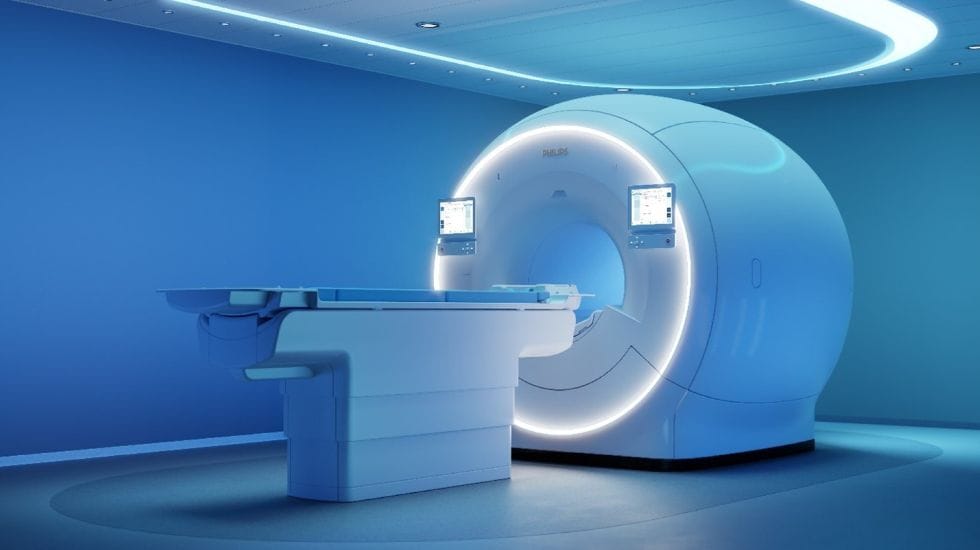Philips marks 50 helium-free MRI operations installs in the UK, expanding care and saving 70,000+ litres in helium
Feb 27, 2025 | 3 minute read
Farnborough United Kingdom– Royal Philips (NYSE: PHG, AEX: PHIA), a global leader in health technology with the world’s first helium-free MRI operations system [1], today announced the 50th installation of its revolutionary BlueSeal 1.5T magnet, which took place at the new Community Diagnostic Centre (CDC) at St Georges Health and Wellbeing Hub in Hornchurch, which is operated by Barking, Havering and Redbridge University Hospitals NHS Trust.

St George’s Health and Wellbeing Hub opened its doors in November, with an ambition to provide an innovative community base offering expanded access to diagnostic testing alongside integrating primary, community, mental health and local authority care services on a single community site. It’s the second CDC to benefit from the MRI technology with Barking Community Hospital having opened in March. Both CDCs, which are run by BHRUT, are equipped with Philips BlueSeal 1.5T magnet, enabling the sites to deliver sustainable diagnostic testing across Havering and its neighbouring boroughs.
Mark Leftwich, Managing Director at Philips UK and Ireland said: “Health technology can be a major driver of sustainable care for the NHS yet nearly one in five leaders rarely or never consider environmental impact within their tendering processes. The link between human and planet health is undeniable and technology like BlueSeal can help NHS services not only improve their carbon footprint but also shift care from treatment to prevention and hospitals to community due to its innovative design. It truly is a proud moment to celebrate this progress with partners who are leading the way in delivering better care for more people. [5]
Philips’ BlueSeal MRI technology is driving sustainable healthcare across the UK, where health services contribute to around 4.5% of total UK carbon emissions [2]. The innovation comprises a Philips MR 5300 scanner equipped with a revolutionary Philips BlueSeal magnet, the global industry's first 1.5T fully sealed magnet, which requires only 0.5% of the helium of a conventional Philips MR system. This significantly reduces consumption of helium, which globally is in scarce supply. Globally, more than 1.9 million litres of helium have been saved by MR systems equipped with Philips’ BlueSeal magnet technology since 2018 [3].
In addition, its innovative design is helping to expand the reach of NHS and private MRI diagnostic services to places where it was previously too difficult to install and maintain these operations, including in remote and isolated communities. This is due to the magnet being 900kg lighter than a traditional system [4] with no added requirement for a quench pipe – needed for traditional MR systems to safely expel large volumes of helium out of a building quickly in case of an emergency. The availability of helium-free MRI operations within the CDC setting can therefore enable quality care to patients who may otherwise not have access to advanced diagnostic scanning.
Havering GP and Clinical Lead for the St George’s Health and Wellbeing Hub at NHS North East London, Dr Atul Aggarwal, said: “We want it to be an innovative, best practice model of integrated health and social care that others can learn from, and that local people can be proud of and benefit from. As well as a range of health, social care, diagnostic and community services available on one site, we expect the Hub to become the catalyst for bringing professionals together to develop new, integrated pathways of care that are focused on meeting patients’ needs.”
Christiane Zelenyanszki, CDC programme director for BHRUT, said: “The environmental benefit of the scanner helps us as a Trust and local health centre be more sustainable but it’s also great for our patients. The advanced technology means it’s a quicker and smoother scan and helps us address inequalities. It also comes with an auto voice which guides patients through their scan helping support them by making them calmer and reducing anxiety.”
Driving sustainable healthcare through its partnerships, Philips continues to cement its commitment to providing better care for more people with innovations like BlueSeal setting a new standard in diagnostic imaging. In June, Philips announced the UK’s first mobile virtually-helium free MRI operations system, followed by the publication of greenhouse gas (GHG) emissions reduction results from collaboration with partners worldwide to assess and mitigate their carbon footprints with the Champalimaud Foundation (Portugal), Rennes University Hospital (France) and County Durham and Darlington NHS Foundation Trust (UK).
Learn more on how Philips is working with pioneering hospitals to take major steps towards decarbonizing healthcare here.
Sources [1] Systems contain 7 liters of helium, fully sealed, no helium can leave the system, Philips.com. [2] British Medical Association: https://www.bma.org.uk/what-we-do/population-health/protecting-people-from-threats-to-health/more-support-needed-to-help-the-nhs-reach-net-zero [3] Philips celebrates 1.9m liters of helium saved as it marks 1,111 helium-free MRI operations installs, expanding care to more patients in more locations: Philips.com [4] Compared to Philips earlier (non-BlueSeal) Ingenia 1.5T ZBO magnet: Philips.com. (in the industry) [5] Philips Future Health Index UK report








